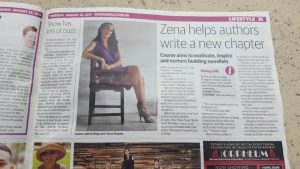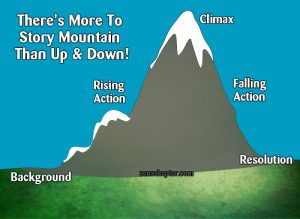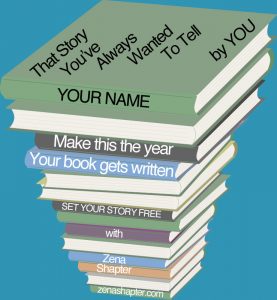February in Australia means the start of a new school year, and new opportunities to learn. For me it also means new opportunities to teach! Here are some of the courses I’m teaching this term:
- The Year Your Book Gets Written
- Creative Writing Essentials
- Story Structure
- Introduction to Creative Writing
- How to Self-Publish a Book
- Blogging Bootcamp
Mentoring, editing, proofreading and publishing work is also rolling in afresh and, although I’m more selective these days about the clients I take on, I really enjoy sharing what I’ve learnt over the years with individuals one-on-one. Since reading English at Birmingham University, I’ve been studying how to write and develop my own style. It’s such a pleasure now to help others do the same.
A couple of weeks ago, I was interviewed for The Mosman Daily about my year-long course, The Year Your Book Gets Written…
 …and the journalist asked me about the biggest mistakes new writers make. I had so many to share!
…and the journalist asked me about the biggest mistakes new writers make. I had so many to share!
Structure
 For me, structure is one of the biggest reasons a writing project might fail (whether it’s a fictional or non-fictional ‘story’), but possibly not for the reasons you might think. Yes, there are formulas. And yes, I believe that checking the right formula for your story can throw up plot flaws and character / narrator issues you might not have otherwise recognised. But most importantly, having a structure for what you want to say ensures you finish.
For me, structure is one of the biggest reasons a writing project might fail (whether it’s a fictional or non-fictional ‘story’), but possibly not for the reasons you might think. Yes, there are formulas. And yes, I believe that checking the right formula for your story can throw up plot flaws and character / narrator issues you might not have otherwise recognised. But most importantly, having a structure for what you want to say ensures you finish.
So many writers get halfway through a story then give up because they have no idea where the story’s going, or the story is going awry and they can’t figure out why. They started with a vague idea of what might happen, hoped the rest of the story would become clear as they wrote, but it didn’t. Talking about your story with a friend can help, but unless that friend understands the basics of story structure – and how it can enable readers to connect with what you want to say – your story will struggle to be the best it can be.
Formatting
The first thing a publisher is going to notice is a writer’s manuscript formatting. As the founder and leader of the Northern Beaches Writers’ Group, I’ve read over 10,000 words of other people’s stories each month for about eight years. Over that time, my eyes have grown so used to the publishing industry’s basic standard for manuscript formatting that anything failing that basic standard now looks odd – I struggle to read it! So I wrote a guide for new writers and clients, which you’re welcome to share it around. You can download it here: “Manuscript Formatting by Zena Shapter”
Transitions
Many new writers don’t appreciate how to construct the individual chapters of larger stories. My definition of a chapter is a series of scenes linked together with a sense of purpose. A series of scenes without a sense of purpose is not a chapter, it’s simply a series of unconnected scenes. Before you start writing a chapter, therefore, you should ideally know exactly what its purpose is within your book, and what it’s trying to achieve for your main character / narrator. With this in mind, both the ‘transitions’ you use to bridge the scenes within your chapter, and the progression of a character or narrator’s line of thought, should flow with ease. If they don’t, it’s a sign that your chapter has no focus.
Point of View
Characters and narrators can only relate events to the reader from their own perspectives – they only know what they can actually see, feel, hear, smell and taste. We cannot head-hop into other people’s minds in real life – and know for sure what they think or feel – and likewise characters / narrators cannot do this in fictional or non-fictional stories.
Character Arcs
In real life, people have goals. They have goals no matter what life experiences come their way. Those goals then change and evolve as new information, disappointments, stresses and achievements effect the opportunities available to them. The same is true in books. Even before the ‘story’ of a book commences, its characters / narrators will want to achieve something in life. New writers often forget this, and forget to foresee how the story to be told will interrelate with those goals.
For me, the best stories involve a character or narrator experiencing change. I believe that’s why we read – to connect with others and see how those others cope with change so we’re better prepared to cope with challenges in our own lives. But unless a writer first establishes the dreams and hopes of their character / narrator at the start of their story, how will readers experience or acknowledge the change they go through and appreciate any challenges they face?
So much more!
 There’s of course so much more to writing stories than the above… Don’t even get me started on realism (why don’t they just call the police!!), motivation (would *you* put your safety on the line for excitement or curiosity alone?), tension (if everything’s going to be okay, why am I reading?), timelines (what *have* they been doing all this time?), sympathy (if they’re going to break the law on purpose, lie to those they love, and be unfair to others, maybe they deserve what happens?), show don’t tell (readers like to decide for themselves!) or Chekhov’s gun issues (after so many scenes trying to locate the potion / learn how to skateboard / rescue the hedgehog surely that’s going to be important in the story’s climax?).
There’s of course so much more to writing stories than the above… Don’t even get me started on realism (why don’t they just call the police!!), motivation (would *you* put your safety on the line for excitement or curiosity alone?), tension (if everything’s going to be okay, why am I reading?), timelines (what *have* they been doing all this time?), sympathy (if they’re going to break the law on purpose, lie to those they love, and be unfair to others, maybe they deserve what happens?), show don’t tell (readers like to decide for themselves!) or Chekhov’s gun issues (after so many scenes trying to locate the potion / learn how to skateboard / rescue the hedgehog surely that’s going to be important in the story’s climax?).
Writers have to work hard to attract and keep their readers, and there are so many ways to do this I thoroughly enjoyed my chat with The Mosman Daily journalist. As I told her, the best thing new writers can do is to take a writing course or make an appointment with a writing mentor. It certainly made all the difference to me when I first started writing! It saves time because you’re learning from writers who have already forged away at the writing rock face for years, and energy because they’ll be able to summarise what you need to know in a nutshell. So if you’ve got a writing project to progress this year, search courses offered at your local writing centre or college, google mentors nearby or those who offer online support, then get in touch. If they’re anything like me, I’m sure they’d be only too pleased to hear that you’re interested in learning more.





